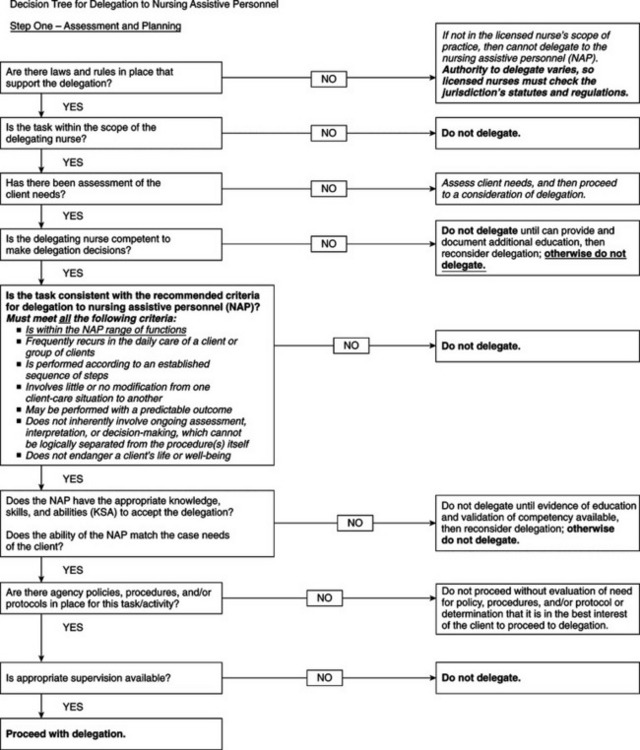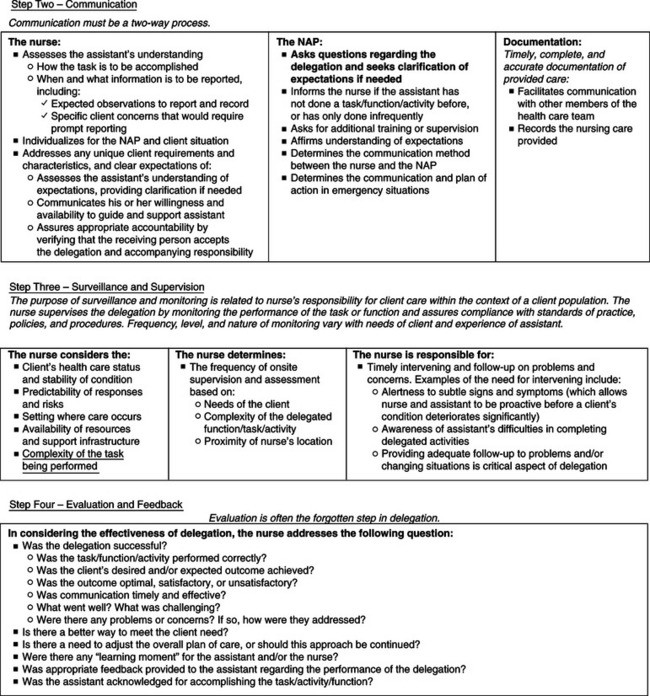CHAPTER 1 Management and provision of nursing care is an exciting, challenging, and rewarding experience. Nurses practice in a variety of care settings as critical members of a multidisciplinary health care team. The delivery of nursing care is accomplished with registered nurses (RNs), licensed vocational nurses (LVNs)/licensed practical nurses (LPNs), and unlicensed assistive personnel. As a manager of care, the RN is responsible for both clinical decision-making and proper delegation of client care to other members of the care delivery team. While each member of the team plays an important role in the care of the client, it is the RN’s responsibility to determine which interventions can be safely delegated to specific team members. The nurse is responsible for prioritizing and individualizing a client’s plan of care. Prioritization is defined as “deciding which needs or problems require immediate action and which ones could be delayed until a later time because they are not urgent” (Silvestri, 2004, p. 65). The RN must identify problems, formulate interventions to address those problems, and prioritize interventions that must be accomplished quickly to achieve optimum client outcomes. However, planning care that is prioritized, individualized, and comprehensive can be challenging due to lack of time and lack of adequate resources. Hansten and Jackson (2004) identify criteria for evaluating and weighing tasks or processes to be prioritized: 1. Is the task or process life threatening or potentially life threatening if not completed? 2. Would another client be endangered if the task is left for later? 3. Is the task or process essential to client or staff safety? 4. Is the task or process essential to the client’s plan of care? Three levels of priority setting (Alfaro-Lefevre, 2004) also aid the nurse in prioritizing nursing care: 1. ABCs—airway, breathing, and/or circulation 2. Mental status changes, unrelated medical issues, acute pain, acute elimination issues, and/or abnormal lab values 3. Health problems such as long-term issues (e.g., coping, rest) While the RN is responsible for the safe delegation of nursing tasks to the appropriate team member, responsibility and accountability for the safe completion of interventions are not delegated and remain the ultimate responsibility of the RN. The nurse must monitor the implementation of the task and determine whether the task was completed appropriately and in a timely manner. After completion of delegated tasks, the nurse must evaluate both the delegation process and client outcomes. Questions that should be answered in evaluating this process include the following: Was the task delegated to the appropriate individual? Did the delegate perform the task correctly and in a timely manner? Was the expected client outcome achieved? Was the client satisfied with the care received? Was the communication between the nurse and the delegate appropriate to accomplish the required intervention? What if anything did not go as planned, and what could have prevented this from occurring? The algorithm on the facing page may be used to assist the nurse in the delegation process (Fig. 1-1): Figure 1-1 National Council of State Boards of Nursing Decision Tree for Delegation to Nursing Assistive Personnel. National Council of State Boards of Nursing Decision Tree for Delegation to Nursing Assistive Personnel. (From the American Nurses Association and the National Council of State Boards of Nursing: Joint statement on delegation [2005]. Available at: www.ncsbn.org/Joint_statement.pdf. Accessed June 9, 2009.)
Prioritization, Delegation, and Critical Thinking in Client Management
PRIORITIZATION
DELEGATION


![]()
Stay updated, free articles. Join our Telegram channel

Full access? Get Clinical Tree


Nurse Key
Fastest Nurse Insight Engine
Get Clinical Tree app for offline access
